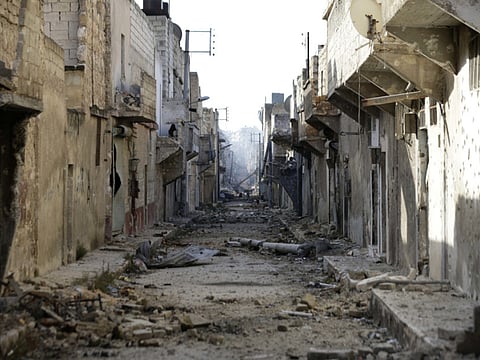The year the unimaginable became real
The conflicts in the Arab world saw the start of a shift in favour of internationally backed government forces

It was in 2016 that the unimaginable became real: a full-blown isolationist won the US presidency shaking global confidence in an already weak international order; the anti-Europeans won the UK referendum threatening the existence of the European Union that has been the bulwark of peace in Europe for decades, and Turkey started a new alliance with Russia that seems to question its continued active membership of Nato as Russia looks for new influence in the Middle East.
This dramatically altered international scene forced some serious introspection in the Arab world as old alliances suddenly looked fragile — for example if former US president George W. Bush could go so far as to dump former Egyptian president Hosni Mubarak so quickly in 2011, what might the far more uninterested US President-elect Donald Trump intend to do? Such concerns encouraged Arab states to refurbish their regional alliances while they wait for global events to unfold. In the Arab world, 2016 saw the wars in Syria, Iraq, Libya and Yemen grind on relentlessly with thousands being killed and tens of thousands joining the millions of refugees that will be part of the Arab world’s future for decades. However, 2016 may also be the year that the long-awaited stabilisation started as the different stalemates in the fighting shifted slightly away from the radicals in favour of regime forces.
This was most obvious in Syria where the year started with both government and rebel forces achieving stable control of their areas. The rebels held the south and a territory around Idlib, while the government strengthened its hold on the centre of the country, while Aleppo remained split between the two sides. But by the end of the year, Russian and Iranian support had destroyed the rebel forces in Aleppo and the government held all of the city.
In Iraq, the long-awaited government assault on Mosul started in October, more than two years after it was captured by Daesh (self-proclaimed Islamic State of Iraq and the Levant). Retaking Mosul will take many months, and despite feverish reporting of every success, the advance has been very slow with much of Mosul still in Daesh control. The action is plagued by uncertain coordination between the many forces anxious to see Daesh leave Mosul, which include the Iraqi army, Iraqi Shiite militias, Kurdish Peshmerga and even Turkish forces, as well as the international coalition’s forces supporting the Iraqis and anyone else that can help.
The most significant military struggle for the Gulf states has been in Yemen, where the Saudi-led coalition managed to get the Iranian-backed Al Houthi militia to the negotiating table in July in Kuwait where a peace deal was almost achieved but then collapsed. That meant the war in the north continued, but in the south the coalition succeeded in establishing effective control and made good progress in eliminating Al Qaida forces that had grabbed control of large territories during the chaos of civil war.
Throughout the year, Iran continued its interference in many Arab states. Iranian-backed militias have dominated events in south Iraq for some years, but in October they joined the fight for Mosul, where they have raised fears of Shiite expansionism in an area which has an overwhelming Sunni majority. Iran also funded and supplied Al Houthi rebels in Yemen, giving them so much support that they became less interested in any peace deal. Domestically, Iran did not see the hoped for economic bonanza from the nuclear deal, because despite some sanctions being dropped, the international banks refused to get involved thus destroying many companies’ hopes of finding new contracts.
Any hope that the nuclear deal might develop a more successful outcome was squashed by the surprise election of Trump to the US presidency. He has no interest in being friendly with the Iranian regime, after a disgusting campaign in which he promised to build a wall on the Mexican border to keep out all “Latino rapists”; punish women for having abortions; attacked on Twitter the parents of a Muslim US soldier who was killed in Iraq, and even suggested that a Clinton presidency could be dealt with by “the Second Amendment people”, by which he referred to the possibility of shooting her.
Since the November result, the world has lived in false hope that Trump will be restrained by the reality of the White House. Unfortunately, this does not look likely as he spent the next few weeks assembling a crew of right wing ex-generals and over-wealthy businessmen to join his cabinet, ignoring the established politicians in the Republican Party.
With America moving sharply to the right, those who looked for some liberal balance from Europe were disappointed by the inward looking European establishment, which focused on German Chancellor Angela Merkel’s deal with Turkey to keep the refugees out, and its next euro crisis.
The surprise Brexit vote in June made real the possibility of leaving the EU to all sorts of right wing parties across the continent which laid bare a range of European insecurities. Meanwhile, in London, the new government struggled to find unity between the pro- and anti-European wings of the Conservatives by the simple strategy of keeping its Brexit plans secret — from the public and the MPs, as well as the rest of Europe!



